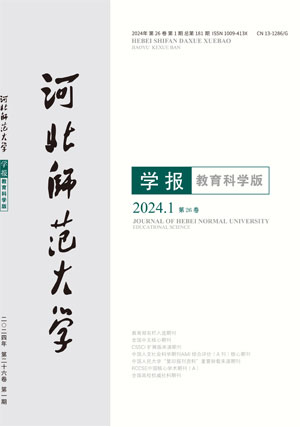期刊信息

- 刊名: 河北师范大学学报(教育科学版)Journal of Hebei Normal University (Educational Science Edition)
- 主办: 河北师范大学
- ISSN: 1009-413X
- CN: 13-1286/G
- 教育部名栏入选期刊
- 全国中文核心期刊
- CSSCI扩展版来源期刊
- AMI综合评价(A刊)核心期刊
- RCCSE中国核心学术期刊
- 全国高校特色栏目社科学报
- 中国人民大学“复印报刊资料”重要转载来源期刊
- 全国高校权威社科期刊
深度学习为核心的高校智慧教育实践路径研究
-
作者单位:(河北工业大学 电子信息工程学院,天津 300401) -
起止页码:68 - 74页 -
DOI:10.13763/j.cnki.jhebnu.ese.2022.04.008
Practical Strategies for University Smart Education Oriented Towards Deep Learning
摘要/Abstract
将现代信息技术和教育教学紧密融合的智慧教育已受到高校普遍重视。“翻转课堂”的推进使课程教学在资源建设、教学方式创新和信息技术支持等方面有了显著成效,但当前高校的智慧教学相对于智慧教育的核心内涵存在较大差距,面临如何落实学生在教学中的主体地位、提升人才的核心素养等深层问题。教育领域深度学习因其能力框架与智慧教育的能力框架高度吻合,是“信息技术”与“智慧教育”的重要桥梁,是解决高校智慧教育改革深层次问题的重要途径。深度学习能够发展学生的高阶思维和知识的迁移和应用能力,促进学生的高级认知。因此,教师需要树立指向深度学习的教学观,做好智慧教育顶层设计,切实推动高校智慧教学改革走向深入。
In colleges and universities, attention has been paid to smart education, which integrates modern information technology with education and teaching. With the development of “flipped classroom,” remarkable achievements have been made in subject teaching in terms of resource construction, pedagogy innovation and IT support. However, there is still a big gap between the current smart teaching in universities and the core connotation of smart education, in the face of deep-seated questions, such as how to enable students to play the main role in teaching and how to improve their core competence. Deep learning in the field of education, with a capability framework highly consistent with that of smart education, is both a bridge between information technology and smart education and a solution to address the deep-seated questions in the smart education reform in universities. Deep learning can develop students' advanced ways of thinking and the abilities to transfer and apply knowledge, as well as enhance students' advanced cognitive abilities. Therefore, it is necessary for educators to adopt principles of pedagogy oriented towards deep learning, and design smart education from the top to promote the reform of smart teaching in universities.
关键词
参考文献 19
- [ 1 ] 桑新民,李曙华,谢阳斌.21世纪:大学课堂向何处去?——“太极学堂”的理念与实践探索[J]. 开放教育研究,2012(2):9-21.
- [ 2 ] 郭建鹏,张娟.我国高校智能教育的进展、问题与实现路径[J]. 河北师范大学学报(教育科学版),2021,23(1):63-69.
- [ 3 ] 祝智庭.国际化人才需求下中国高校毕业生就业能力发展研究——基于在华德企对中国高校毕业生的期望及实现情况调研[J]. 华东师范大学学报(教育科学版),2021(11):115-126.
- [ 4 ] 郭华.深度学习与课堂教学改进[J]. 基础教育课程,2019(21):10-15.
- [ 5 ] 安富海.翻转课堂:一定要指向深度学习[J]. 中小学教材教学,2018(7):32-35.
- [ 6 ] 安富海.人工智能时代的教学论研究:聚焦深度学习[J]. 西北师大学报(社会科学版),2020(9):119-126.
- [ 7 ] 祝智庭,彭红超.深度学习:智慧教育的核心支柱[J]. 中国教育学刊,2017(5):36-44.
- [ 8 ] 祝智庭,彭红超.创新发展技术赋能的智慧教育——访我国智慧教育开拓者祝智庭教授[J]. 教师教育学报,2021(4):21-29.
- [ 9 ] 顾小清.智慧教育的理论框架、实践路径、发展脉络及未来图景[J]. 华东师范大学学报(教育科学版),2021(8):20-32.
- [ 10 ] Ackoff R L.From Data to Wisdom[J]. Journal of Applied Systems Analysis,1989(16):3-9.
- [ 11 ] Marton F, saljo r. On Qualitative Difference in Learning:i-out-come And Process[J]. British Journal of Edecational Psychology,1976(4):4-11.
- [ 12 ] National Research Council. Education for Life and Work:Developing Transferable Knowledge and Skills in the 21st century[M]. Washington,D C:National Academies Press, 2013.
- [ 13 ] 余文森.论核心素养导向的三大教学观[J]. 当代教育与文化,2019(3):62-66.
- [ 14 ] 祝智庭.智慧教育引领未来学校教育创变[J]. 基础教育,2021(2):5-20.
- [ 15 ] 卢强.翻转课堂的冷思考:实证与反思[J]. 电化教育研究,2013(8):96.
- [ 16 ] [美]安德森,等著.布卢姆教育目标分类学:分类学视野下的学与教及其测评[M]. 蒋小平,等译.北京:外语教学与研究出版社,2009.
- [ 17 ] Shelley Wright. Flipping Bloom's Taxonomy[EB/OL]. (2012-05-15)[2017-05-29]. http://plpnetwork.com/2012/05/15/flipping-blooms-taxonomy.
- [ 18 ] 祝智庭,雷云鹤.翻转课堂2.0:走向创造驱动的智慧学习[J]. 电化教育研究,2016(3):5-12.
- [ 19 ] Career and Technical Education Definitions. Webb's Depth of Knowledge Guide[EB/OL]. (2016-03-20)[2018-05-23]. http://max.book/18.com/html/2016/0320/38118906.shtm.
